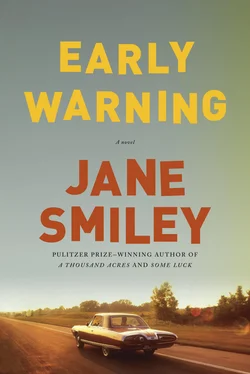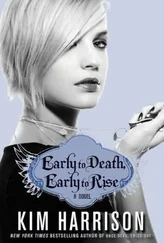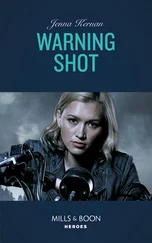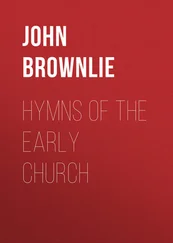Jane Smiley - Early Warning
Здесь есть возможность читать онлайн «Jane Smiley - Early Warning» весь текст электронной книги совершенно бесплатно (целиком полную версию без сокращений). В некоторых случаях можно слушать аудио, скачать через торрент в формате fb2 и присутствует краткое содержание. Год выпуска: 2015, Издательство: Knopf, Жанр: Современная проза, на английском языке. Описание произведения, (предисловие) а так же отзывы посетителей доступны на портале библиотеки ЛибКат.
- Название:Early Warning
- Автор:
- Издательство:Knopf
- Жанр:
- Год:2015
- ISBN:нет данных
- Рейтинг книги:5 / 5. Голосов: 1
-
Избранное:Добавить в избранное
- Отзывы:
-
Ваша оценка:
- 100
- 1
- 2
- 3
- 4
- 5
Early Warning: краткое содержание, описание и аннотация
Предлагаем к чтению аннотацию, описание, краткое содержание или предисловие (зависит от того, что написал сам автор книги «Early Warning»). Если вы не нашли необходимую информацию о книге — напишите в комментариях, мы постараемся отыскать её.
, a national best seller published to rave reviews from coast to coast.
Early Warning — читать онлайн бесплатно полную книгу (весь текст) целиком
Ниже представлен текст книги, разбитый по страницам. Система сохранения места последней прочитанной страницы, позволяет с удобством читать онлайн бесплатно книгу «Early Warning», без необходимости каждый раз заново искать на чём Вы остановились. Поставьте закладку, и сможете в любой момент перейти на страницу, на которой закончили чтение.
Интервал:
Закладка:
He kept walking up Front until he found the subway station at Fulton Street, and went home. Once he got there, he was in such a good mood that he sat with Janny for half an hour, listening about the Halloween party at school (Mary Kemp had real wings — well, not real, but see-through — and Doug Lester came as Satan and the teacher sent him home). Richie and Michael had gone out dressed as a pirate and a cowboy. They were now fighting over the sword and the gun.
Frank had a long history of knowing exactly what he was doing. He looked at a thing, there was a click, and he was right. All he had to do was act on that thing. It hadn’t started in the war, but he had noticed it in the war — he always knew before he fired his weapon whether he was going to get a kill or not. The other snipers in his squad had talked a little about the same feeling. Lyman Hill, the best of them, thought it was a predatory instinct — not the instinct of a wolf, but that of a hawk or an owl, a sightline followed by a swoop. Frank pictured the woman again in his mind. He tried to imagine what she had been doing in the last seventeen years that had brought her to this street corner in New York City. He couldn’t imagine it, but he knew that he would find out.
1962

STEVE SLOAN DECIDED that he was going to learn to play the guitar, and Stanley Sloan went along with this — he chose bass. Tim didn’t know anything about music except that he liked everything but Ricky Nelson. The Sloan boys had been up to Philly and gone to American Bandstand. Tim liked the Marvelettes, and who did not like “The Duke of Earl”? But he had never thought about actually making music.
Steve Sloan never saw anything that he didn’t think he could do, and anyway, his uncle on his mother’s side was a piano player in various musical establishments up and down the Jersey Shore. He bopped around the halls at school muttering “Stand by Me” under his breath, just, Tim knew, to be showing off. But the girls smiled fondly as he walked by. Tim had been trying to cultivate a more reserved demeanor, interesting but distant. It wasn’t working. So he chose rhythm guitar.
When he asked his mom for a guitar, she looked at him and said, “Oh, that would be fun. Your uncle Frank had a lovely voice as a boy, and, of course, Granny Elizabeth quite enjoyed playing the piano.” She walked away, humming. This was not quite the response he was looking for. At least, Mrs. Sloan would throw up her hands and say, “Not again! I wish you boys would quit bothering me!”
They played in the Sloan brothers’ room. Steve said that they would learn three chords — that was all you needed at first — then they would work on rhythm, and in the meantime, they would find a drummer of some sort, but he had to be steady. It didn’t matter if he was their friend; in fact, it was better if he wasn’t. He would be their employee.
In the years he had known Steve and Stanley, they had gotten in a fair amount of trouble. Steve had started Tim smoking, Steve was the one who had the beers, and the one who didn’t mind driving without a license if it had to be done; that time they hitchhiked to Norfolk had been his idea (Mom and Dad had never even heard about that one). His way had always been, I’m doing this, and you can come along if you want. But now he stood over Tim and Stanley, showing them the chords, how to place the fingers of the left hand and how to strum with the right, and he counted and stopped them and started them and counted again. He wasn’t terribly patient, especially with Stanley, but at the end of two and a half weeks, they could play “Tom Dooley,” which only had two chords, D and G, and “This Train,” which carried no gamblers, no crap shooters or midnight ramblers. Steve and Stanley’s mom taught them “Follow the Drinking Gourd,” which she said was about slaves heading north to freedom before the Civil War — the Drinking Gourd was the Big Dipper, which pointed to the North Star. Steve sang the lyrics, and Stanley sang the harmony. Tim sang “hey hey hey,” or “woo woo,” and sometimes came in on the refrain. About three-quarters of the time, they finished together.
Steve now began looking for a “gig,” which was a chance to play together in public, and Tim sincerely hoped that he would fail in this attempt. Over the next two weeks, they added “Frankie and Johnnie” and “Good Night, Irene” to their “repertoire.” But three girls came up to him on three consecutive days and said, “Hey, Tim. I hear you guys have a band,” and all he had to do was kind of cock his head and shrug and say, “Just getting started, really.” Then he would lean back against the wall and rest his right foot behind his left foot and act as if he had all the time in the world, and the girls would giggle and smile and hug their books to their chests and look up at him, and this made him realize that he was getting pretty tall.
—
“WELL, THEY AREN’T my nightmares,” said Andy, “but I think they’re interesting and important, and since she’s screaming almost every night, maybe we should talk about them.”
“Maybe we should,” said Dr. Grossman.
Andy sat up. She and Dr. Grossman exchanged a glance that indicated to Andy that their usual relationship was taking a little break, and they gave each other that feminine once-over — hair, necklace, stockings, shoes. Then Andy said, “Last night, it was pretty obvious. I mean, no hidden meanings here. It was a boom and a mushroom cloud.”
“Janny is how old now?”
“Eleven. She’ll be twelve in the fall.”
“How do you think she knows about these things?”
“How would she not?” said Andy. “My neighbor two doors down is building a bomb shelter behind his house, down below the kitchen. The workmen have been there for two weeks, putting in the angled air pipes. Their little girl — her name is Melissa — told Janny last week that if she happened to be spending the night when the bomb came she could go into the shelter, but if she was at our house they wouldn’t let her in. Or us, either. Now Janny wants to build a bomb shelter.”
“What do you think about that?” said Dr. Grossman.
“About building a bomb shelter?”
“No, about what the child said to her.”
“It sounds fair,” said Andy. Then she sighed. “If we have the news on, she puts her fingers in her ears, and she really presses them hard so she can’t hear. Sometimes she goes into the kitchen and I can hear her humming all through the news to drown it out.”
“Have you and your husband tried to explain to her—”
“What is there to explain?” said Andy. “Frank would never build a bomb shelter.”
Dr. Grossman fell silent.
Andy imagined Dr. Grossman sitting, quietly reading intellectual books in German — not only Freud, but The Sorrows of Young Werther. Dr. Grossman and Mr. Grossman would be sitting in matching armchairs, and somehow their reading or their experience had taught them to accept what must be accepted, rather than to fear it. Normally, Dr. Grossman’s office, neat and tastefully decorated, was calming. But today the very light said, “No hope.” Andy didn’t terribly mind if the failure of hope was hers — she was used to that — but she did mind if the failure of hope was Dr. Grossman’s. She felt herself become a little angry.
She flashed out, “Nordmennene vise seg å være rett allikevel, ikke sant?”
“Excuse me?” said Dr. Grossman.
“Admit it!”
“Admit what?”
“There is no salvation.”
“I never said that there was,” said Dr. Grossman.
Читать дальшеИнтервал:
Закладка:
Похожие книги на «Early Warning»
Представляем Вашему вниманию похожие книги на «Early Warning» списком для выбора. Мы отобрали схожую по названию и смыслу литературу в надежде предоставить читателям больше вариантов отыскать новые, интересные, ещё непрочитанные произведения.
Обсуждение, отзывы о книге «Early Warning» и просто собственные мнения читателей. Оставьте ваши комментарии, напишите, что Вы думаете о произведении, его смысле или главных героях. Укажите что конкретно понравилось, а что нет, и почему Вы так считаете.











